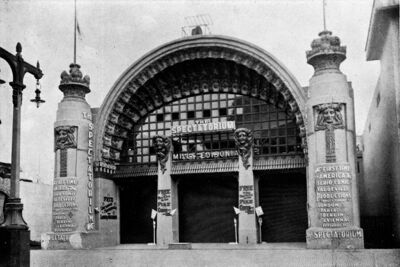Mills Edisonia Spectatorium: Difference between revisions
(Created page with "b") |
No edit summary |
||
| (One intermediate revision by the same user not shown) | |||
| Line 1: | Line 1: | ||
{{short description|Mills Edisonia Spectatorium}} | |||
{{Infobox FairBuilding | |||
| name = Mills Edisonia Spectatorium | |||
| image = Spectorium Main.jpg | |||
| image_alt = | |||
| image_size = 400px | |||
| caption = Main entrance of the Spectorium | |||
| alternate_name = Byaphone Theatre | |||
| location = [[The Pike]] | |||
| no_buildings = | |||
| construction_cost= $7,100(${{Format price|{{Inflation|US|7,100|1904}}}} in {{Inflation/year|US}}) | |||
| furnishing_cost = | |||
| profit = | |||
| owner = Ode D. Jennings | |||
| architect = | |||
| dimensions = | |||
| adult_entry = Free | |||
| child_entry = | |||
| opening_day = | |||
| dedication_day = | |||
| special_day = | |||
| other = | |||
| floorplan_image = | |||
| ticket_image = | |||
}} | |||
A large ornately decorated building, The Mills Edisonia Spectatorium was billed as the only free admission entry on [[The Pike]]. This early arcade was also known as the Byaphone Theatre. | |||
==Etymology== | |||
==Before the Fair== | |||
The Mills Novelty company was founded in the early 1890’s by Mortimer Birdsul Mills, a Canadian immigrant and inventor. He named his new business MBM Cigar Vending Company based on his patented method of delivering the desired product to the customer from a vending machine. | |||
Ode D. Jennings (born in Kentucky on September 6, 1874), worked for the Mills Novelty Company and ran The Spectatorium. He would later later establish a competitor to Mills. | |||
The travel machines, provided by Thomas Edison's Company, showcased exotic locales of Europe and the United States. One viewer could see San Francisco from Telegraph Hill, or see the Swiss Alps, or Paris. | |||
The building was conceived by a partnership with Thomas Edison; a energetic, yet poor man- Herbert S. Mills, conceived the idea of perfecting the slot machine. Through his invention, Mills created the Mills Novelty Company with the capital of $500,000 dollars. By the time of the Fair, Mills was famous for his slot/vending machines. | |||
During the 1893 World's Fair, the Spectatorium attraction remained incomplete. It was later sold for $2,250. Steele MacKaye, an inventor, created the financially-troubled attraction, and died in 1894. | |||
The Spectatorium was also at the 1900 Paris World's Fair. Mills won gold and bronze awards at that Exposition. | |||
==Description== | |||
The edifice housed several hundred coin-operated machines that showcased movies (mostly about travel), and many commodities such as candy, gum, peanuts, cigars, and lead stamps. | |||
Other machines gave out the Fairgoers' weight, strength, grip power, lung capacity (for singing), lifting, and hitting power, that is, after the coin was paced into the slot. | |||
The Spectatorium was also used by the Fair's Official Photographer. | |||
At night, it was said that the Spectatorium has grandly lit to dazzle the Pike-goers eye. | |||
==After the Fair== | |||
==See also== | |||
==Notes== | |||
==References== | |||
==External links== | |||
[[Category:Pike]] | |||
Latest revision as of 01:16, 1 November 2023
 | |
| Alternative names | Byaphone Theatre |
|---|---|
| Location | The Pike |
| Owner | Ode D. Jennings |
| Construction | |
| Construction Cost | $7,100($214,131 in 2021) |
| Entry | |
| Adult Entry | Free |
A large ornately decorated building, The Mills Edisonia Spectatorium was billed as the only free admission entry on The Pike. This early arcade was also known as the Byaphone Theatre.
Etymology[edit | edit source]
Before the Fair[edit | edit source]
The Mills Novelty company was founded in the early 1890’s by Mortimer Birdsul Mills, a Canadian immigrant and inventor. He named his new business MBM Cigar Vending Company based on his patented method of delivering the desired product to the customer from a vending machine.
Ode D. Jennings (born in Kentucky on September 6, 1874), worked for the Mills Novelty Company and ran The Spectatorium. He would later later establish a competitor to Mills.
The travel machines, provided by Thomas Edison's Company, showcased exotic locales of Europe and the United States. One viewer could see San Francisco from Telegraph Hill, or see the Swiss Alps, or Paris.
The building was conceived by a partnership with Thomas Edison; a energetic, yet poor man- Herbert S. Mills, conceived the idea of perfecting the slot machine. Through his invention, Mills created the Mills Novelty Company with the capital of $500,000 dollars. By the time of the Fair, Mills was famous for his slot/vending machines.
During the 1893 World's Fair, the Spectatorium attraction remained incomplete. It was later sold for $2,250. Steele MacKaye, an inventor, created the financially-troubled attraction, and died in 1894.
The Spectatorium was also at the 1900 Paris World's Fair. Mills won gold and bronze awards at that Exposition.
Description[edit | edit source]
The edifice housed several hundred coin-operated machines that showcased movies (mostly about travel), and many commodities such as candy, gum, peanuts, cigars, and lead stamps.
Other machines gave out the Fairgoers' weight, strength, grip power, lung capacity (for singing), lifting, and hitting power, that is, after the coin was paced into the slot.
The Spectatorium was also used by the Fair's Official Photographer.
At night, it was said that the Spectatorium has grandly lit to dazzle the Pike-goers eye.
